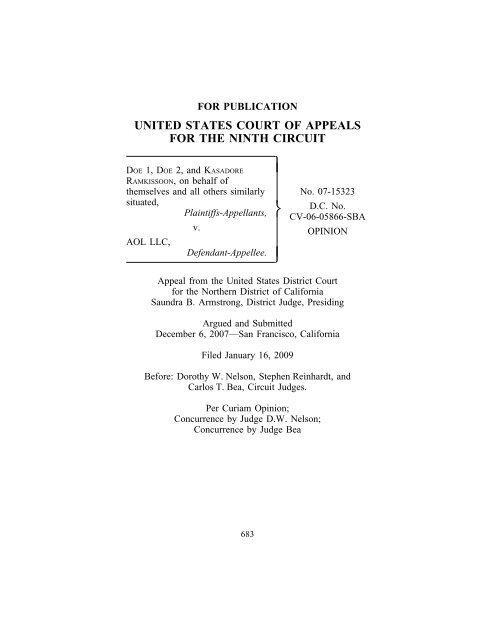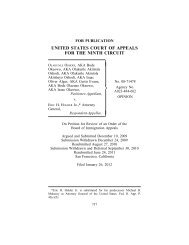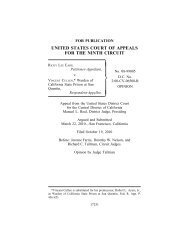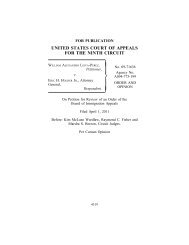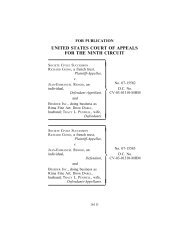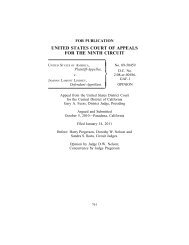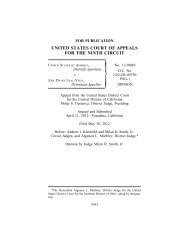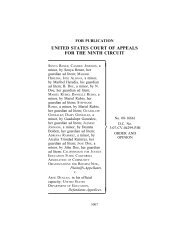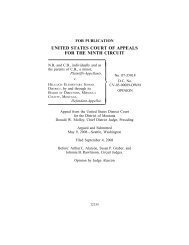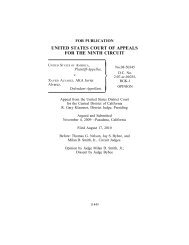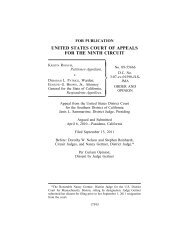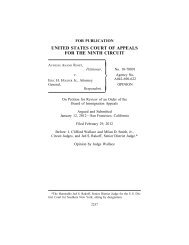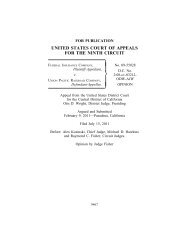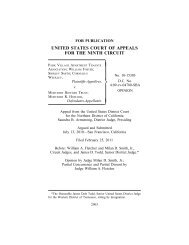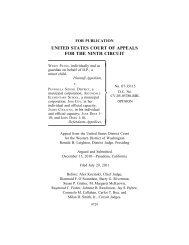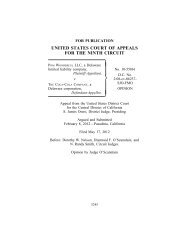Ramkissoon v. AOL LLC - Ninth Circuit Court of Appeals
Ramkissoon v. AOL LLC - Ninth Circuit Court of Appeals
Ramkissoon v. AOL LLC - Ninth Circuit Court of Appeals
Create successful ePaper yourself
Turn your PDF publications into a flip-book with our unique Google optimized e-Paper software.
FOR PUBLICATION<br />
UNITED STATES COURT OF APPEALS<br />
FOR THE NINTH CIRCUIT<br />
DOE 1, DOE 2, and KASADORE<br />
RAMKISSOON, on behalf <strong>of</strong><br />
themselves and all others similarly No. 07-15323<br />
situated, D.C. No.<br />
Plaintiffs-Appellants, CV-06-05866-SBA<br />
v.<br />
OPINION<br />
<strong>AOL</strong> <strong>LLC</strong>,<br />
Defendant-Appellee.<br />
Appeal from the United States District <strong>Court</strong><br />
for the Northern District <strong>of</strong> California<br />
Saundra B. Armstrong, District Judge, Presiding<br />
Argued and Submitted<br />
December 6, 2007—San Francisco, California<br />
Filed January 16, 2009<br />
Before: Dorothy W. Nelson, Stephen Reinhardt, and<br />
Carlos T. Bea, <strong>Circuit</strong> Judges.<br />
Per Curiam Opinion;<br />
Concurrence by Judge D.W. Nelson;<br />
Concurrence by Judge Bea<br />
683
686 DOE 1 v. <strong>AOL</strong> <strong>LLC</strong><br />
COUNSEL<br />
Joseph J. Tabacco, Jr., Christopher T. Heffelfinger, Berman<br />
DeValerio Pease Tabacco Burt & Pucillo, San Francisco, California;<br />
C. Oliver Burt, III, Berman DeValerio Pease Tabacco<br />
Burt & Pucillo, West Palm Beach, Florida; Richard R. Wiebe,<br />
Law Office <strong>of</strong> Richard R. Wiebe, San Francisco, California;<br />
and James K. Green, James K. Green, P.A., West Palm<br />
Beach, Florida, for the plaintiffs-appellants.<br />
Patrick J. Carome, Samir C. Jain, D. Hien Tran, Wilmer Cutler<br />
Pickering Hale and Dorr LLP, Washington, D.C., for the<br />
defendant-appellee.<br />
PER CURIAM:<br />
OPINION<br />
On July 31, 2006, <strong>AOL</strong> <strong>LLC</strong> (formerly America Online,<br />
Inc.) made publicly available the internet search records <strong>of</strong><br />
more than 650,000 <strong>of</strong> its members. The records contained personal<br />
and sometimes embarrassing information about the<br />
members. Plaintiffs, members <strong>of</strong> <strong>AOL</strong>, brought an action in<br />
federal district court in California on behalf <strong>of</strong> themselves and<br />
a putative nationwide class <strong>of</strong> <strong>AOL</strong> members, alleging violations<br />
<strong>of</strong> federal electronic privacy law, 18 U.S.C. § 2702(a).<br />
A subclass <strong>of</strong> <strong>AOL</strong> members who are California residents<br />
also alleged various violations <strong>of</strong> California law, including the<br />
California Consumers Legal Remedies Act, California Civil<br />
Code § 1770.
Under the <strong>AOL</strong> Member Agreement, all plaintiffs agreed to<br />
a forum selection clause that designates the “courts <strong>of</strong> Virginia”<br />
as the fora for disputes between <strong>AOL</strong> and its members.<br />
The Member Agreement also contains a choice <strong>of</strong> law clause<br />
designating Virginia law to govern disputes.<br />
<strong>AOL</strong> moved to dismiss the action for improper venue pursuant<br />
to Federal Rule <strong>of</strong> Civil Procedure 12(b)(3), on the basis<br />
<strong>of</strong> the parties’ forum selection clause. <strong>AOL</strong> contends the<br />
clause permits plaintiffs to refile their consumer class action<br />
in state or federal court in Virginia. Plaintiffs contend the<br />
forum selection clause limits them to Virginia state court,<br />
where a class action remedy would be unavailable to them;<br />
this, they contend, violates California public policy favoring<br />
consumer class actions and renders the forum selection clause<br />
unenforceable.<br />
The district court granted <strong>AOL</strong>’s motion and dismissed the<br />
action without prejudice to plaintiffs refiling it in a state or<br />
federal court in Virginia. We hold the district court erred<br />
when it interpreted the forum selection clause to permit<br />
actions in either state or federal court in Virginia; the plain<br />
language <strong>of</strong> the clause—courts “<strong>of</strong>” Virginia—demonstrates<br />
the parties chose Virginia state courts as the only fora for any<br />
disputes. We reverse and remand for further proceedings.<br />
A. The Complaint<br />
DOE 1 v. <strong>AOL</strong> <strong>LLC</strong><br />
I.<br />
687<br />
Plaintiffs Kasadore <strong>Ramkissoon</strong> and Doe 1 and Doe 2, 1<br />
members <strong>of</strong> <strong>AOL</strong>, filed a class action complaint in the District<br />
1 Plaintiffs and <strong>AOL</strong> filed a joint stipulation and proposed order to allow<br />
Doe 1 and Doe 2 to proceed anonymously, because <strong>of</strong> the sensitive nature<br />
<strong>of</strong> the personal information Doe 1 and Doe 2 claim <strong>AOL</strong> publicly disclosed<br />
about them. The district court granted the motion, which ruling is<br />
not at issue on appeal.
688 DOE 1 v. <strong>AOL</strong> <strong>LLC</strong><br />
<strong>Court</strong> for the Northern District <strong>of</strong> California against <strong>AOL</strong> on<br />
behalf <strong>of</strong> themselves and a nationwide putative class <strong>of</strong> <strong>AOL</strong><br />
members. The complaint alleges <strong>Ramkissoon</strong> currently is a<br />
resident <strong>of</strong> New York, while Doe 1 and Doe 2 currently are<br />
residents <strong>of</strong> California. The complaint does not state when<br />
Doe 1 and Doe 2 became residents <strong>of</strong> California, where they<br />
resided when they entered into the Member Agreement with<br />
<strong>AOL</strong>, or where they resided when they used <strong>AOL</strong>’s services.<br />
<strong>AOL</strong> provides its members with access to the Internet and<br />
a variety <strong>of</strong> related features, including search tools and security<br />
features. The complaint alleges that on July 31, 2006,<br />
“roughly twenty million <strong>AOL</strong> Internet search records were<br />
packaged into a database” and made publicly available for<br />
download for a period <strong>of</strong> approximately ten days. The data<br />
consisted <strong>of</strong> the records <strong>of</strong> which internet sites were visited by<br />
nearly 658,000 <strong>AOL</strong> members who conducted such visits<br />
from approximately March 2006 through May 2006. <strong>AOL</strong><br />
does not contest this occurrence.<br />
The complaint alleges the data contained the addresses,<br />
phone numbers, credit card numbers, social security numbers,<br />
passwords and other personal information <strong>of</strong> <strong>AOL</strong> members.<br />
Plaintiffs also allege the searches reveal members’ “personal<br />
struggles with various highly personal issues, including sexuality,<br />
mental illness, recovery from alcoholism, and victimization<br />
from incest, physical abuse, domestic violence, adultery,<br />
and rape,” by revealing their Internet searches for information<br />
on these issues. Although <strong>AOL</strong> admitted it made a “mistake”<br />
and took down the data, “mirror” websites appeared on the<br />
internet that reproduced the data. Some <strong>of</strong> these websites<br />
present the data in a searchable form and others “invite the<br />
public to openly criticize and pass judgment on <strong>AOL</strong> members<br />
based on their searches.”<br />
Plaintiffs’ complaint alleges seven causes <strong>of</strong> action. Two <strong>of</strong><br />
the causes <strong>of</strong> action—violation <strong>of</strong> the federal Electronic Com-
DOE 1 v. <strong>AOL</strong> <strong>LLC</strong><br />
munications Privacy Act, 18 U.S.C. § 2702(a), 2 and unjust<br />
enrichment under federal common law—are brought on<br />
behalf <strong>of</strong> all plaintiffs and the putative nationwide class.<br />
The other five causes <strong>of</strong> action are brought under California<br />
statutory and common law. Doe 1 and Doe 2 bring these<br />
claims on behalf <strong>of</strong> the putative sub-class <strong>of</strong> <strong>AOL</strong> members<br />
who are California residents. They allege <strong>AOL</strong> violated the<br />
following California statutes: (1) the California Consumers<br />
Legal Remedies Act (CLRA), 3 which prohibits unfair methods<br />
<strong>of</strong> competition and unfair or deceptive acts or practices<br />
resulting in the sale <strong>of</strong> goods or services; (2) the California<br />
Customer Records Act, 4 which requires businesses to destroy<br />
customers’ records that are no longer to be maintained, and<br />
requires businesses to maintain security procedures to protect<br />
customers’ personal information; (3) California False Advertising<br />
law; 5 and (4) California Unfair Competition law, 6 which<br />
prohibits unfair, unlawful, and fraudulent business practices.<br />
These California plaintiffs also allege <strong>AOL</strong> committed the tort<br />
<strong>of</strong> public disclosure <strong>of</strong> private facts under California common<br />
law.<br />
B. The Forum Selection and Choice <strong>of</strong> Law Clause<br />
<strong>AOL</strong>’s headquarters are located in Dulles, Virginia. All<br />
members <strong>of</strong> <strong>AOL</strong>’s online service, including all plaintiffs and<br />
putative class members, must agree to the <strong>AOL</strong> Member<br />
Agreement as a prerequisite to register for <strong>AOL</strong> service. Each<br />
member must click on a box that states the member has<br />
2 18 U.S.C. § 2702(a) prohibits an entity that provides an electronic<br />
communications service or remote computing service from knowingly<br />
divulging, except in certain circumstances, the contents <strong>of</strong> an electronic<br />
communication or a record or other information about a subscriber.<br />
3 Cal. Civ. Code § 1770.<br />
4 Cal. Civ. Code § 1798.81.<br />
5 Cal. Bus. & Pr<strong>of</strong>. Code § 17500 et seq.<br />
6 Cal. Bus. & Pr<strong>of</strong>. Code § 17200 et seq.<br />
689
690 DOE 1 v. <strong>AOL</strong> <strong>LLC</strong><br />
agreed to the terms <strong>of</strong> the Member Agreement before he can<br />
complete his registration.<br />
The Member Agreement contains a choice <strong>of</strong> law clause<br />
that designates Virginia law, excluding its conflict-<strong>of</strong>-law<br />
rules. It also contains a forum selection clause that designates<br />
the “courts <strong>of</strong> Virginia” as the fora for disputes between <strong>AOL</strong><br />
and its members. The choice <strong>of</strong> law and forum selection<br />
clause <strong>of</strong> the Member Agreement in effect during the time<br />
period relevant to the complaint—January 1, 2004 through<br />
September 22, 2006—states in its entirety:<br />
The laws <strong>of</strong> the Commonwealth <strong>of</strong> Virginia, excluding<br />
its conflicts-<strong>of</strong>-law rules, govern this Member<br />
Agreement and your membership. You expressly<br />
agree that exclusive jurisdiction for any claim or dispute<br />
with <strong>AOL</strong> or relating in any way to your membership<br />
or your use <strong>of</strong> the <strong>AOL</strong> Services resides in<br />
the courts <strong>of</strong> Virginia and you further agree and<br />
expressly consent to the exercise <strong>of</strong> personal jurisdiction<br />
in the courts <strong>of</strong> Virginia in connection with<br />
any such dispute including any claim involving <strong>AOL</strong><br />
or <strong>AOL</strong> Services. The foregoing provision may not<br />
apply to you depending on the laws <strong>of</strong> your jurisdiction.<br />
This Agreement shall not be governed by the<br />
United Nations Convention on Contracts for the<br />
International Sale <strong>of</strong> Goods.<br />
C. District <strong>Court</strong> Order<br />
Based on the forum selection clause, <strong>AOL</strong> moved to dismiss<br />
the action for improper venue under Federal Rule <strong>of</strong><br />
Civil Procedure 12(b)(3) (“Rule 12(b)(3)”), or, alternatively,<br />
to transfer venue to the District <strong>Court</strong> for the Eastern District<br />
<strong>of</strong> Virginia pursuant to 28 U.S.C. § 1406(a). 7 The district<br />
7 28 U.S.C. § 1406(a) states: “The district court <strong>of</strong> a district in which is<br />
filed a case laying venue in the wrong division or district shall dismiss, or<br />
if it be in the interest <strong>of</strong> justice, transfer such case to any district or division<br />
in which it could have been brought.”
DOE 1 v. <strong>AOL</strong> <strong>LLC</strong><br />
court granted <strong>AOL</strong>’s Rule 12(b)(3) motion to dismiss and<br />
adopted <strong>AOL</strong>’s proposed order in its entirety. The district<br />
court held the forum selection clause “expressly requires that<br />
this controversy be adjudicated in a court in Virginia” and that<br />
“[p]laintiffs agreed the courts <strong>of</strong> Virginia have ‘exclusive<br />
jurisdiction’ over any claims or disputes with <strong>AOL</strong>, and venue<br />
in the Northern District <strong>of</strong> California is improper.” The order<br />
dismissed plaintiffs’ complaint “without prejudice to the refiling<br />
<strong>of</strong> their claims in a state or federal court in Virginia.”<br />
II.<br />
We review a district court’s order enforcing a contractual<br />
forum selection clause and dismissing a case for improper<br />
venue for abuse <strong>of</strong> discretion. Argueta v. Banco Mexicano,<br />
S.A., 87 F.3d 320, 323 (9th Cir. 1996). Where the interpretation<br />
<strong>of</strong> contractual language in a forum selection clause does<br />
not turn on the credibility <strong>of</strong> extrinsic evidence but on an<br />
application <strong>of</strong> the principles <strong>of</strong> contract interpretation, we<br />
review the district court’s interpretation de novo. Hunt Wesson<br />
Foods, Inc. v. Supreme Oil Co., 817 F.2d 75, 77 (9th Cir.<br />
1987).<br />
A motion to enforce a forum selection clause is treated as<br />
a motion to dismiss pursuant to Rule 12(b)(3); pleadings need<br />
not be accepted as true, and facts outside the pleadings may<br />
be considered. Argueta, 87 F.3d at 324.<br />
III.<br />
691<br />
As a threshold matter, the parties dispute the meaning <strong>of</strong><br />
the forum selection clause, specifically the phrase “exclusive<br />
jurisdiction . . . resides in the courts <strong>of</strong> Virginia.” <strong>AOL</strong> claims<br />
the phrase “courts <strong>of</strong> Virginia” refers to state and federal<br />
courts in Virginia, while plaintiffs claim it refers to Virginia<br />
state courts only. We agree with plaintiffs’ interpretation.<br />
[1] We apply federal law to the interpretation <strong>of</strong> the forum<br />
selection clause. Manetti-Farrow, Inc. v. Gucci Am., Inc., 858
692 DOE 1 v. <strong>AOL</strong> <strong>LLC</strong><br />
F.2d 509, 513 (9th Cir. 1988). When we interpret a contract<br />
under federal law, we look for guidance “to general principles<br />
for interpreting contracts.” Klamath Water Users Protective<br />
Ass’n v. Patterson, 204 F.3d 1206, 1210 (9th Cir. 1999).<br />
[2] “Contract terms are to be given their ordinary meaning,<br />
and when the terms <strong>of</strong> a contract are clear, the intent <strong>of</strong> the<br />
parties must be ascertained from the contract itself. Whenever<br />
possible, the plain language <strong>of</strong> the contract should be considered<br />
first.” Id. (internal citation omitted). We apply the “primary<br />
rule <strong>of</strong> interpretation . . . that the common or normal<br />
meaning <strong>of</strong> language will be given to the words <strong>of</strong> a contract<br />
unless circumstances show that in a particular case a special<br />
meaning should be attached to it.” Hunt Wesson Foods, Inc.,<br />
817 F.2d at 77 (internal quotation marks and alteration omitted).<br />
We read a written contract as a whole, and interpret each<br />
part with reference to the whole. Klamath Water Users Protective<br />
Ass’n, 204 F.3d at 1210. That the parties dispute a contract’s<br />
meaning does not render the contract ambiguous; a<br />
contract is ambiguous “if reasonable people could find its<br />
terms susceptible to more than one interpretation.” Id.<br />
[3] The district court, without discussion, interpreted the<br />
forum selection clause to refer to state and federal courts <strong>of</strong><br />
Virginia. We determine the meaning <strong>of</strong> the phrase “courts <strong>of</strong><br />
Virginia” de novo, Hunt Wesson Foods, Inc., 817 F.2d at 77,<br />
and look first to its plain meaning. We have not previously<br />
addressed the meaning <strong>of</strong> a forum selection clause designating<br />
the courts “<strong>of</strong>,” rather than “in,” a state. We hold that the<br />
forum selection clause at issue here—designating the courts<br />
<strong>of</strong> Virginia—means the state courts <strong>of</strong> Virginia only; it does<br />
not also refer to federal courts in Virginia.<br />
[4] The clause’s use <strong>of</strong> the preposition “<strong>of</strong>”—rather than<br />
“in”—is determinative. Black’s Law Dictionary defines “<strong>of</strong>”<br />
as a term “denoting that from which anything proceeds; indicating<br />
origin, source, descent, and the like . . . .” 8 Black’s Law<br />
8 In contrast, the proposition “in” “express[es] relation <strong>of</strong> presence, existence,<br />
situation, inclusion, action, etc.; inclosed or surrounded by limits,
DOE 1 v. <strong>AOL</strong> <strong>LLC</strong><br />
693<br />
Dictionary 1080 (6th ed. 1990). Thus, courts “<strong>of</strong>” Virginia<br />
refers to courts proceeding from, with their origin in, Virginia<br />
—i.e., the state courts <strong>of</strong> Virginia. Federal district courts, in<br />
contrast, proceed from, and find their origin in, the federal government.<br />
9<br />
Our interpretation finds support among opinions by our sister<br />
circuits who have addressed the meaning <strong>of</strong> forum selection<br />
clauses designating the “courts <strong>of</strong>” a state—all <strong>of</strong> whom<br />
have interpreted such clauses to refer to the state courts <strong>of</strong> the<br />
designated state, and not also to the federal courts in the designated<br />
state. See Am. Soda, LLP v. U.S. Filter Wastewater<br />
Group, Inc., 428 F.3d 921, 926 (10th Cir. 2005) (interpreting<br />
“<strong>Court</strong>s <strong>of</strong> the State <strong>of</strong> Colorado” to mean Colorado state<br />
courts; the clause “refers to sovereignty rather than geography”);<br />
Dixon v. TSE Int’l Inc., 330 F.3d 396, 398 (5th Cir.<br />
2003) (interpreting “<strong>Court</strong>s <strong>of</strong> Texas, U.S.A.” to mean Texas<br />
state courts; “[f]ederal district courts may be in Texas, but<br />
they are not <strong>of</strong> Texas”); LFC Lessors, Inc. v. Pac. Sewer<br />
Maint. Corp., 739 F.2d 4, 7 (1st Cir. 1984) (interpreting<br />
forum selection and choice <strong>of</strong> law clause stating the contract<br />
shall be interpreted according to “the law, and in the courts,<br />
<strong>of</strong> the Commonwealth <strong>of</strong> Massachusetts” to designate the<br />
state courts <strong>of</strong> Massachusetts; “the word ‘<strong>of</strong>’ as it appears in<br />
the phrase in question must have been intended to restrict the<br />
meaning <strong>of</strong> both ‘law’ and ‘courts’ to those that trace their<br />
origin to the state.”).<br />
as in a room; also meaning for, in and about, on, within etc. . . . .” Black’s<br />
Law Dictionary 758 (6th ed. 1990).<br />
9 Reading the forum selection and choice <strong>of</strong> law clause as a whole further<br />
supports this reasonable interpretation. See Klamath Water Users Protective<br />
Ass’n, 204 F.3d at 1210. The clause contains both a forum selection<br />
provision by which the parties agreed to the “courts <strong>of</strong> Virginia” as the<br />
fora for their disputes, and a choice <strong>of</strong> law provision by which the parties<br />
agreed to apply the “laws <strong>of</strong> the Commonwealth <strong>of</strong> Virginia.” The state<br />
courts <strong>of</strong> Virginia are the ultimate determiners <strong>of</strong> the “laws <strong>of</strong> the Commonwealth<br />
<strong>of</strong> Virginia”; a federal court in Virginia merely follows Virginia<br />
law.
694 DOE 1 v. <strong>AOL</strong> <strong>LLC</strong><br />
[5] Accordingly, we hold the plain meaning <strong>of</strong> the forum<br />
selection clause’s designation <strong>of</strong> the “courts <strong>of</strong> Virginia” is<br />
the state courts <strong>of</strong> Virginia; it does not include federal district<br />
courts located in Virginia. 10<br />
IV.<br />
Having interpreted the <strong>AOL</strong> forum selection clause to designate<br />
Virginia state courts, we turn to the enforceability <strong>of</strong><br />
the clause.<br />
Plaintiffs contend the forum selection clause so construed<br />
is unenforceable as a matter <strong>of</strong> federal law, because it violates<br />
California public policy against waivers <strong>of</strong> class action remedies<br />
and rights under the California Consumers Legal Remedies<br />
Act. <strong>AOL</strong>, however, steadfastly has asserted the forum<br />
selection clause permits plaintiffs to maintain an action in federal<br />
court in Virginia, where plaintiffs could pursue their consumer<br />
class action remedies. <strong>AOL</strong> has raised no contention<br />
that the forum selection clause, construed to mean only Virginia<br />
state courts, nevertheless is enforceable and does not<br />
violate California public policy.<br />
[6] We apply federal law to determine the enforceability <strong>of</strong><br />
the forum selection clause. Manetti-Farrow, 858 F.2d at 513.<br />
A forum selection clause is presumptively valid; the party<br />
seeking to avoid a forum selection clause bears a “heavy burden”<br />
to establish a ground upon which we will conclude the<br />
clause is unenforceable. M/S Bremen v. Zapata Off-Shore Co.,<br />
407 U.S. 1, 17 (1972). Under the directives <strong>of</strong> the Supreme<br />
<strong>Court</strong> in Bremen, we will determine a forum selection clause<br />
10 We find no ambiguity in the forum selection clause. Even if we did<br />
find the phrase ambiguous, we would interpret it in plaintiffs’ favor. The<br />
parties produced no other evidence <strong>of</strong> their expressed intent. Accordingly,<br />
we would construe the contract against <strong>AOL</strong> as the drafter and adopt<br />
plaintiffs’ reasonable interpretation <strong>of</strong> the phrase to mean the state courts<br />
<strong>of</strong> Virginia. See InterPetrol Bermuda Ltd v. Kaiser Aluminum Int’l Corp.,<br />
719 F.2d 992, 998 (9th Cir. 1984).
DOE 1 v. <strong>AOL</strong> <strong>LLC</strong><br />
695<br />
is unenforceable “if enforcement would contravene a strong<br />
public policy <strong>of</strong> the forum in which suit is brought, whether<br />
declared by statute or by judicial decision.” Id. at 15 (emphasis<br />
added).<br />
California has declared “by judicial decision” the same<br />
<strong>AOL</strong> forum selection clause at issue here contravenes a strong<br />
public policy <strong>of</strong> California—as applied to California residents<br />
who brought claims under California statutory consumer law<br />
in California state court. In America Online, Inc. v. Superior<br />
<strong>Court</strong> <strong>of</strong> Alameda County (Mendoza), 108 Cal. Rptr. 2d 699<br />
(Cal. Ct. App. 2001), Mendoza, a California resident and<br />
member <strong>of</strong> <strong>AOL</strong>, brought a putative class action on behalf <strong>of</strong><br />
<strong>AOL</strong> members in California state court, alleging violations <strong>of</strong><br />
California state law, to wit: the California Consumers Legal<br />
Remedies Act, the California Unfair Business Practices Act,<br />
and common law conversion and fraud. Mendoza, 108 Cal.<br />
Rptr. 2d at 702.<br />
<strong>AOL</strong> moved to dismiss Mendoza’s action based on its<br />
forum selection clause designating the “courts <strong>of</strong> Virginia.”<br />
Id. at 701-02. The state trial court denied <strong>AOL</strong>’s motion,<br />
holding the forum selection clause was unenforceable because<br />
it “diminished” the rights <strong>of</strong> California consumers, and remedies<br />
available in Virginia were not “comparable” to those in<br />
California. 11 Id. at 703.<br />
<strong>AOL</strong> filed a petition for writ <strong>of</strong> mandamus. The California<br />
<strong>Court</strong> <strong>of</strong> Appeal denied the writ, thereby leaving in place the<br />
trial court’s denial <strong>of</strong> <strong>AOL</strong>’s motion to dismiss. Relevant to<br />
the instant appeal, the California <strong>Court</strong> <strong>of</strong> Appeal held the<br />
11 The trial court also denied <strong>AOL</strong>’s motion on the basis the forum selection<br />
clause was unconscionable under California law because the clause<br />
was not negotiated, was contained in a standard form contract, and “was<br />
in a format that was not readily identifiable by Mendoza.” Id. at 703. The<br />
<strong>Court</strong> <strong>of</strong> Appeal did not reach the trial court’s unconscionability ruling,<br />
because it affirmed on other grounds. Id. at 713 n.17.
696 DOE 1 v. <strong>AOL</strong> <strong>LLC</strong><br />
<strong>AOL</strong> forum selection clause was unenforceable, because the<br />
clause violated California public policy on two grounds: (1)<br />
enforcement <strong>of</strong> the forum selection clause violated California<br />
public policy that strongly favors consumer class actions,<br />
because consumer class actions are not available in Virginia<br />
state courts, id. at 712; 12 and (2) enforcement <strong>of</strong> the forum<br />
selection clause violates the anti-waiver provision <strong>of</strong> the Consumer<br />
Legal Remedies Act (CLRA), id. at 710, which states<br />
“[a]ny waiver by a consumer <strong>of</strong> the provisions <strong>of</strong> this title is<br />
contrary to public policy and shall be unenforceable and<br />
void.” Cal. Civ. Code § 1751. The state <strong>Court</strong> <strong>of</strong> Appeal held<br />
the forum selection clause, together with the choice <strong>of</strong> law<br />
provision, effect a waiver <strong>of</strong> statutory remedies provided by<br />
the CLRA in violation <strong>of</strong> the anti-waiver provision, as well as<br />
California’s “strong public policy” to “protect consumers<br />
against unfair and deceptive business practices.” 13 Mendoza,<br />
108 Cal. Rptr. 2d at 710.<br />
[7] We agree with plaintiffs that Mendoza is the kind <strong>of</strong><br />
declaration “by judicial decision” contemplated by Bremen.<br />
Mendoza found a California public policy against consumer<br />
12 The California <strong>Court</strong> <strong>of</strong> Appeal expressed “the importance class<br />
action consumer litigation has come to play” in California and noted California<br />
courts have “extolled” “the right to seek class action relief in consumer<br />
cases.” Mendoza, 108 Cal. Rptr. 2d at 712. In Virginia state court,<br />
in contrast, class action relief for consumer claims is unavailable. Id.; Kent<br />
Sinclair & Leigh B. Middleditch, Jr., Virginia Civil Procedure § 3.11 (4th<br />
ed. 2003) (Virginia “does not have a statute or rule authorizing a ‘class<br />
action’ comparable to such proceedings under Rule 23 <strong>of</strong> the Federal<br />
Rules <strong>of</strong> Civil Procedure or the statutes and rules <strong>of</strong> most sister states.”)<br />
(emphasis in original).<br />
13 The California <strong>Court</strong> <strong>of</strong> Appeal noted its conclusion on this point was<br />
“reinforced by a statutory comparison <strong>of</strong> California and Virginia consumer<br />
protection laws, which reveals Virginia’s law provides significantly less<br />
consumer protection to its citizens than California law provides for our<br />
own.” Id. at 710. Specifically, the court noted Virginia consumer protection<br />
law has a shorter statute <strong>of</strong> limitations, has a lower required minimum<br />
recovery amount, and does not provide the enhanced remedies for disabled<br />
and senior citizens which the CLRA provides. Id.
DOE 1 v. <strong>AOL</strong> <strong>LLC</strong><br />
class action waivers and waivers <strong>of</strong> consumer rights under the<br />
CLRA that California public policy applies to California residents<br />
bringing class action claims under California consumer<br />
law. As to such California resident plaintiffs, Mendoza holds<br />
California public policy is violated by forcing such plaintiffs<br />
to waive their rights to a class action and remedies under California<br />
consumer law.<br />
[8] Accordingly, the forum selection clause in the instant<br />
member agreement is unenforceable as to California resident<br />
plaintiffs bringing class action claims under California consumer<br />
law. 14<br />
REVERSED and REMANDED. 15<br />
697<br />
D.W. Nelson, Senior <strong>Circuit</strong> Judge, and Reinhardt, <strong>Circuit</strong><br />
Judge, concurring:<br />
Plaintiffs Doe 1 and 2 have alleged sufficient facts to<br />
invoke California’s public policy. California courts have<br />
made clear that they will “refuse to defer to the selected<br />
forum if to do so would substantially diminish the rights <strong>of</strong><br />
California residents in a way that violates our state’s public<br />
policy.” Mendoza, 108 Cal. Rptr. 2d 699, 707 (Cal. 2001)<br />
(emphasis added). In this case, plaintiffs, who allege that they<br />
were California residents at the time <strong>of</strong> the filing <strong>of</strong> the complaint,<br />
are bringing claims under California’s consumer protection<br />
statutes, while the defendant seeks to enforce the same<br />
<strong>AOL</strong> contract by relying on the exact contract provisions that<br />
14 The members <strong>of</strong> this panel, however, disagree as to whether the plaintiffs<br />
in the instant case have established the <strong>AOL</strong> forum selection clause<br />
is unenforceable as to them, or whether further development <strong>of</strong> the record<br />
is necessary on remand.<br />
15 Plaintiffs’ requests for judicial notice <strong>of</strong> an <strong>AOL</strong> memorandum <strong>of</strong> law<br />
in an unrelated litigation and an <strong>AOL</strong> press release stating <strong>AOL</strong> will move<br />
its headquarters to New York are denied as moot.
698 DOE 1 v. <strong>AOL</strong> <strong>LLC</strong><br />
Mendoza refused to apply. Nothing in California law suggests<br />
that a plaintiff must have been a resident for any period <strong>of</strong><br />
time before invoking California’s public policy. To the contrary,<br />
being a resident at the time the complaint is filed is sufficient.<br />
See id. at 708, 709 (evaluating the effect <strong>of</strong> the forum<br />
selection clause on the rights <strong>of</strong> “California residents”).<br />
As the per curiam opinion recognizes, California’s Consumer<br />
Legal Remedies Act states that “[a]ny waiver by a consumer<br />
<strong>of</strong> the provisions <strong>of</strong> this title is contrary to public<br />
policy and shall be unenforceable and void.” Cal. Civ. Code<br />
§ 1751. California public policy is <strong>of</strong>fended by any clause that<br />
would require the plaintiffs, being California residents, to pursue<br />
their claims in a forum that does not permit class actions.<br />
This is true regardless <strong>of</strong> whether plaintiffs’ rights are waived<br />
directly by a forum selection clause or indirectly, as our colleague<br />
proposes, through conflicts <strong>of</strong> law analysis. As Mendoza<br />
made clear, “Enforcement <strong>of</strong> the contractual forum<br />
selection and choice <strong>of</strong> law clauses would be the functional<br />
equivalent <strong>of</strong> a contractual waiver <strong>of</strong> the consumer protections<br />
under the CLRA and, thus, is prohibited under California<br />
law.” Mendoza, 108 Cal. Rptr. 2d at 702 (emphasis added).<br />
As a result, no further pleadings are necessary. Any purported<br />
waiver <strong>of</strong> the rights <strong>of</strong> a California consumer is unenforceable.<br />
Our colleague has created a pleading requirement premised<br />
on a supposed distinction between California “consumers”<br />
and California “residents.” However, Mendoza treats California<br />
consumers and California residents as interchangeable,<br />
making it clear that, at least for the purposes <strong>of</strong> the California<br />
Consumers Legal Remedies Act, no such distinction exists<br />
under California law. This is not surprising given that it is difficult,<br />
if not impossible, to reside somewhere without also<br />
consuming there. Every California resident is a California<br />
consumer. Moreover, the California courts have never applied<br />
a pleading requirement such as that proposed by our colleague.<br />
If California wishes to adopt such a requirement, its
DOE 1 v. <strong>AOL</strong> <strong>LLC</strong><br />
courts are free to do so. However, as a federal court sitting in<br />
diversity jurisdiction, we apply, but do not create, state law.<br />
See Erie R. Co. v. Tompkins, 304 U.S. 64 (1938). Thus, we<br />
may not do so here.<br />
We would add that we do not share our colleague’s fear<br />
that there will be a rush by out-<strong>of</strong>-staters to establish California<br />
residency in order to file consumer class actions—that we<br />
face a new “Gold Rush.” No such rush has occurred in the<br />
past despite the state’s policy designed to protect California<br />
consumers’ right to file class actions in cases <strong>of</strong> fraud or “unfair<br />
and deceptive business practices.” Mendoza, 108 Cal.<br />
Rptr. 2d at 710. 1 The chain <strong>of</strong> horrors tactic is not a credible<br />
one as urged in this case. There are far better reasons to move<br />
to the Golden State than are conjured up here by our imaginative<br />
and creative colleague.<br />
BEA, <strong>Circuit</strong> Judge, concurring:<br />
699<br />
I concur in the court’s judgment reversing the district<br />
court’s dismissal order and remanding for further proceedings.<br />
However, I would remand to allow the plaintiffs an<br />
opportunity to plead and prove facts to establish California<br />
law and public policy apply to their action and that, therefore,<br />
California public policy is violated by enforcement <strong>of</strong> the<br />
<strong>AOL</strong> contractual forum selection clause.<br />
California has a public policy against the waiver <strong>of</strong> the<br />
class action procedural mechanism by California consumers,<br />
as well as the waiver <strong>of</strong> consumer rights under the California<br />
Consumer Legal Remedies Act (CLRA). But that public pol-<br />
1 Judge Bea’s reliance on the example <strong>of</strong> Seymour Lazar is entirely out<br />
<strong>of</strong> place. Mr. Lazar was a Californian from childhood. See Rhonda L.<br />
Rundle, “Legal Setback: A Career in <strong>Court</strong>s Leads to Trouble For Seymour<br />
Lazar,” Wall St. J., Jan. 19, 2006, at A1.
700 DOE 1 v. <strong>AOL</strong> <strong>LLC</strong><br />
icy applies to California consumers bringing class action<br />
claims under California consumer law. It is not a foregone<br />
conclusion that the <strong>AOL</strong> forum selection clause (or, for that<br />
matter, the choice <strong>of</strong> law clause) is unenforceable as to plaintiffs.<br />
For the forum selection and the choice <strong>of</strong> law clauses to<br />
be unenforceable, plaintiffs must establish they are protected<br />
by California law and public policy.<br />
As the California Supreme <strong>Court</strong> has explained, a consumer<br />
class action waiver violates California public policy if<br />
it is unconscionable because it operates as an exculpatory<br />
clause, exempting a defendant from liability—to the extent<br />
the obligation at issue is governed by California law. See Discover<br />
Bank v. Superior <strong>Court</strong>, 113 P.3d 1100, 1109 (Cal.<br />
2005) (“Such one-sided, exculpatory contracts in a contract <strong>of</strong><br />
adhesion, at least to the extent they operate to insulate a party<br />
from liability that otherwise would be imposed under California<br />
law, are generally unconscionable.” (emphasis added)).<br />
Where, however, liability is not controlled by California law<br />
—for example because a valid choice <strong>of</strong> law provision or conflict<br />
<strong>of</strong> laws principles dictate the application <strong>of</strong> the laws <strong>of</strong><br />
another state or country—California’s public policy against<br />
consumer class action waivers is not implicated. See id.<br />
Moreover, enforcement <strong>of</strong> the <strong>AOL</strong> forum selection and<br />
choice <strong>of</strong> law clause violates the CLRA statutory anti-waiver<br />
provision, California Civil Code § 1751, only if plaintiffs are<br />
California consumers who otherwise would be protected by<br />
California law. See Cal. Civ. Code § 1751 (“Any waiver by<br />
a consumer <strong>of</strong> the provisions <strong>of</strong> this title is contrary to public<br />
policy and shall be unenforceable and void.”). If plaintiffs<br />
have no contacts with California and are not covered by the<br />
CLRA, they have no protection under the California law<br />
“which would otherwise govern”; hence, they have nothing to<br />
waive. See Am. Online Inc. v. Mendoza, 108 Cal. Rptr. 2d<br />
699, 706, 708-09 (Cal. App. 1st Dist. 2001).
DOE 1 v. <strong>AOL</strong> <strong>LLC</strong><br />
701<br />
Based on the allegations in plaintiffs’ complaint, however,<br />
it is not clear whether they are California consumers protected<br />
by California law. 1 Plaintiffs’ complaint, as it currently<br />
stands, is devoid <strong>of</strong> factual allegations that would support a<br />
conclusion that California law would apply, notwithstanding<br />
the Virginia choice <strong>of</strong> law provision. Plaintiffs’ complaint<br />
alleges Doe 1 and Doe 2 “currently”—as <strong>of</strong> the time they<br />
filed their complaint—are residents <strong>of</strong> California. It further<br />
alleges the “California subclass” <strong>of</strong> plaintiffs is comprised <strong>of</strong><br />
“<strong>AOL</strong> members in the State <strong>of</strong> California.” The complaint is<br />
silent as to the place <strong>of</strong> the contracting, the place where the<br />
contract was negotiated, the place where the contract was per-<br />
1 To determine whether California or Virginia law would apply, we<br />
would apply federal conflict <strong>of</strong> law rules, as set forth in the Restatement<br />
(Second) <strong>of</strong> Conflicts <strong>of</strong> Laws. See Huynh v. Chase Manhattan Bank, 465<br />
F.3d 992, 997 (9th Cir. 2006). Under the Restatement, the parties’ chosen<br />
law <strong>of</strong> Virginia will apply unless either (a) Virginia has no substantial<br />
relationship to the parties or transaction and there is no other reasonable<br />
basis for the parties’ choice <strong>of</strong> law, or (b) application <strong>of</strong> Virginia law<br />
“would be contrary to a fundamental policy <strong>of</strong> a state which has a materially<br />
greater interest than the chosen state in the determination <strong>of</strong> the particular<br />
issue and which, under the rule <strong>of</strong> [Restatement (Second) <strong>of</strong> Conflict<br />
<strong>of</strong> Laws] § 188, would be the state <strong>of</strong> the applicable law in the absence<br />
<strong>of</strong> an effective choice <strong>of</strong> law by the parties.” Restatement (Second) <strong>of</strong><br />
Conflict <strong>of</strong> Laws § 187 (1971). Plaintiffs do not claim Virginia has no substantial<br />
relation to the transaction; after all, Virginia is where <strong>AOL</strong> has its<br />
principal place <strong>of</strong> business. See Discover Bank v. Superior <strong>Court</strong>, 36 Cal.<br />
Rptr. 3d 456, 458-59 (2005) (holding Delaware had a substantial relation<br />
to transaction where defendant Discover Bank was domiciled in that<br />
state).<br />
To determine whether California “has a materially greater interest” than<br />
Virginia and would be the state <strong>of</strong> the applicable law in the absence <strong>of</strong> an<br />
effective choice <strong>of</strong> law by the parties, § 188 directs us to take into account<br />
the following contacts to determine the applicable law: (a) the place <strong>of</strong><br />
contracting; (b) the place <strong>of</strong> negotiation <strong>of</strong> the contract; (c) the place <strong>of</strong><br />
performance; (d) the location <strong>of</strong> the subject matter <strong>of</strong> the contract; and (e)<br />
the domicile, residence, nationality, place <strong>of</strong> incorporation, and place <strong>of</strong><br />
business <strong>of</strong> the parties. Restatement (Second) <strong>of</strong> Conflict <strong>of</strong> Laws § 188<br />
(1971). Here, plaintiffs’ voluminous complaint is curiously silent as to any<br />
and all <strong>of</strong> the determinative contacts mentioned in the Restatement.
702 DOE 1 v. <strong>AOL</strong> <strong>LLC</strong><br />
formed, the location <strong>of</strong> the subject matter <strong>of</strong> the contract, or<br />
the residency <strong>of</strong> the <strong>AOL</strong> members at the time <strong>of</strong> their injuries.<br />
Cf. Klussman v. Cross Country Bank, 36 Cal. Rptr. 3d<br />
728, 740-41 (Cal. App. 1st. Dist. 2005) (noting that California<br />
had a materially greater interest than Delaware in the application<br />
<strong>of</strong> its own law where the consumer contracts were formed<br />
in California, the allegedly illegal conduct took place at the<br />
plaintiffs’ homes in California, and the plaintiffs were residents<br />
<strong>of</strong> California at the time <strong>of</strong> injury). The sole relevant<br />
allegation is that, as <strong>of</strong> the time <strong>of</strong> filing the complaint, Doe<br />
1 and Doe 2 were residents <strong>of</strong> California. That alone is simply<br />
insufficient to establish California law would govern plaintiffs’<br />
action. Even in the absence <strong>of</strong> a choice <strong>of</strong> law or forum<br />
selection clause, residency is but one factor to be considered<br />
in determining whether California law applies. “California,<br />
despite its interest in securing recovery for its residents, will<br />
not apply its law to conduct in other jurisdictions resulting in<br />
injury in those jurisdictions.” McGhee v. Arabian Am. Oil<br />
Co., 871 F.2d 1412, 1425 (9th Cir. 1989).<br />
There is no “declar[ation] by statute or by judicial decision,”<br />
M/S Bremen v. Zapata Off-Shore Co., 407 U.S. 1, 17<br />
(1972), that California public policy against consumer rights<br />
waivers could possibly be <strong>of</strong>fended by enforcing a contractual<br />
class action waiver against a party whose sole connection to<br />
California is residency at the time he filed a consumer class<br />
action in a California court. 2 My colleagues’ suggestion other-<br />
2 The majority cites Mendoza for the proposition that mere residency at<br />
the time <strong>of</strong> filing a complaint is sufficient to invoke California public policy.<br />
Mendoza neither said nor held any such thing. In Mendoza, there was<br />
no dispute whether the plaintiffs were California consumers entitled to<br />
invoke the protection <strong>of</strong> California consumer law, not merely California<br />
residents. See Mendoza, 108 Cal. Rptr. 2d at 706, 707, 708 (discussing<br />
“California consumers” and “this state’s consumers”). What Mendoza did<br />
was use the phrase “California residents” twice. See id. at 708, 709. And<br />
in each case, the court explained California courts would not enforce contract<br />
provisions that would diminish the rights <strong>of</strong> California residents in<br />
a way that would violate California public policy. Id. at 708, 709. These
DOE 1 v. <strong>AOL</strong> <strong>LLC</strong><br />
703<br />
wise would permit a citizen <strong>of</strong> another state to move to California<br />
for the sole purpose <strong>of</strong> serving as a class representative<br />
and clothing himself with the protections <strong>of</strong> consumerfriendly<br />
California public policy. This would magnetize California<br />
courts to pull in out-<strong>of</strong>-state contracts, actions or omissions.<br />
I see nothing in California consumer-protection statutes<br />
or cases that would invite such a new Gold Rush.<br />
I am admittedly not as sanguine as my colleagues as to the<br />
non-litigation attractions which bring class action plaintiffs to<br />
the Golden State. They mention, but do not describe, “far better<br />
reasons” for class action representative plaintiffs moving<br />
to California than simply to become class action plaintiffs. I<br />
am reminded <strong>of</strong> Mr. Lazar, <strong>of</strong> Palm Springs, California, recipient<br />
<strong>of</strong> Mel Weiss’s kickbacks to become a class action representative<br />
plaintiff in several cases. 3 With thanks to my<br />
colleagues for their encomium, it doesn’t really require one to<br />
be “imaginative and creative” to suspect the class representatives<br />
may not have become California residents for reasons<br />
other than class action litigation status and are not really California<br />
consumers entitled to California consumer protection.<br />
My concurrence merely requires the plaintiff class representatives<br />
plead and prove they really are California consumers<br />
by stating facts which make California substantive law<br />
applicable to them, pursuant to the well-known rules <strong>of</strong> federal<br />
choice <strong>of</strong> law, set forth in the Restatement. This point<br />
statements assume, but do not put, analyze, nor determine, the ultimate<br />
question: whether the forum selection and choice <strong>of</strong> law clauses violate<br />
California public policy.<br />
The majority’s logical syllogism—all California residents are California<br />
consumers—says nothing about whether the plaintiffs are California consumers<br />
<strong>of</strong> <strong>AOL</strong> products entitled to invoke the protection <strong>of</strong> California<br />
public policy in the instant litigation.<br />
3 See The Wall Street Journal Law Blog, http://blogs.wsj.com/law/<br />
?s=seymour+lazar (last visited August 20, 2008).
704 DOE 1 v. <strong>AOL</strong> <strong>LLC</strong><br />
seems to be brushed away by the majority as an unnecessary<br />
technicality by a misreading <strong>of</strong> Mendoza.<br />
Accordingly, I would remand for plaintiffs to be permitted<br />
to file an amended complaint to allege facts—if they can so<br />
allege—that would demonstrate contacts with California sufficient<br />
to establish their causes <strong>of</strong> action are controlled by<br />
California law.


